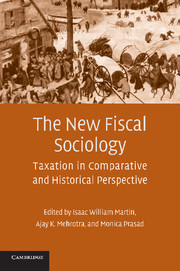Book contents
- Frontmatter
- Contents
- List of Contributors
- Acknowledgments
- Foreword
- 1 The Thunder of History: The Origins and Development of the New Fiscal Sociology
- PART ONE SOCIAL SOURCES OF TAXATION: AMERICAN TAX POLICY IN COMPARATIVE PERSPECTIVE
- PART TWO TAXPAYER CONSENT
- PART THREE THE SOCIAL CONSEQUENCES OF TAXATION
- 10 Extraction and Democracy
- 11 Improving Tax Administration in Contemporary African States: Lessons from History
- 12 Adam Smith and the Search for an Ideal Tax System
- 13 Where's the Sex in Fiscal Sociology?: Taxation and Gender in Comparative Perspective
- 14 The Shoup Mission to Japan: Two Political Economies Intersect
- Epilogue: A Renaissance for Fiscal Sociology?
- References
- Index
12 - Adam Smith and the Search for an Ideal Tax System
Published online by Cambridge University Press: 13 January 2010
- Frontmatter
- Contents
- List of Contributors
- Acknowledgments
- Foreword
- 1 The Thunder of History: The Origins and Development of the New Fiscal Sociology
- PART ONE SOCIAL SOURCES OF TAXATION: AMERICAN TAX POLICY IN COMPARATIVE PERSPECTIVE
- PART TWO TAXPAYER CONSENT
- PART THREE THE SOCIAL CONSEQUENCES OF TAXATION
- 10 Extraction and Democracy
- 11 Improving Tax Administration in Contemporary African States: Lessons from History
- 12 Adam Smith and the Search for an Ideal Tax System
- 13 Where's the Sex in Fiscal Sociology?: Taxation and Gender in Comparative Perspective
- 14 The Shoup Mission to Japan: Two Political Economies Intersect
- Epilogue: A Renaissance for Fiscal Sociology?
- References
- Index
Summary
In this chapter I use Adam Smith's 1776 treatise, An Inquiry into the Nature and Causes of the Wealth of Nations, to show how the present U.S. tax system has strayed from capitalist ideals at the same time that we imagine ourselves the model capitalist state. I use Adam Smith (who some call the first sociologist) because of Smith's status as the father of capitalism and modern economics as well as for the interplay in Smith's work between the empirical and the philosophical.
I conclude that Smith's ideal tax system consists of two complementary taxes: a flat rate consumption tax with a refundable credit large enough to support what we now call the living wage, combined with a flat rate wealth tax. By investigating the specific conditions that Smith faced, I conclude that his ideal was impossible during his lifetime because of the structural, institutional, and cultural conditions present in eighteenth-century Britain. Based on his writings, I show that Smith himself understood that his larger concepts were not attainable given the administrative restrictions of his era (Salomon 1945). However, Smith also believed that ideas can speak across time and culture. In this chapter, I explore both Smith's ideal and the ways in which he tempered that ideal because he was aware of, and worked with, the limitations of his own time. The dual tax I derive from Smith's writings is very different from our present experience.
- Type
- Chapter
- Information
- The New Fiscal SociologyTaxation in Comparative and Historical Perspective, pp. 201 - 215Publisher: Cambridge University PressPrint publication year: 2009



